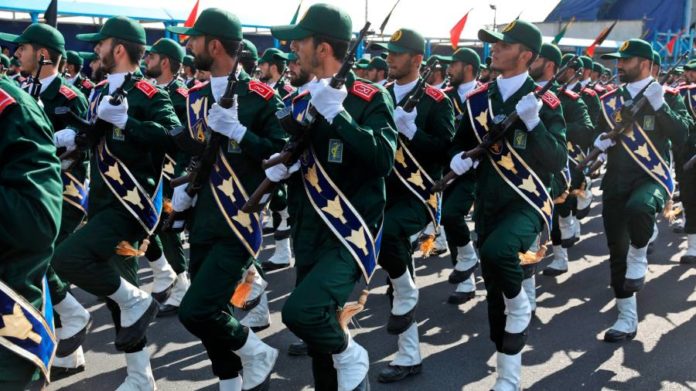The EU is exploring legal options to designate Iran’s Revolutionary Guards as a terrorist organisation, in a big policy shift that would risk ending any hopes of restoring an international agreement aimed at preventing Tehran from developing the capacity to produce a nuclear weapon.
The move, which has the support of France and Germany — both parties to an international nuclear agreement with Iran — comes in response to Tehran’s supply of armed drones to Russia for use in its war against Ukraine, along with its violent crackdown on domestic protests.
Paris and Berlin voiced their support for the measure in a meeting of foreign ministers last week, four officials with knowledge of the discussions told the Financial Times. The EU’s legal service will draft an opinion for the bloc’s 27 capitals on the legality of the measure within the next three weeks.
“Yes, some member states are supporting this proposal,” Josep Borrell, the EU’s foreign policy chief, said in an interview. “Many would be in favour.”
It is highly unusual for governments to designate another state’s military as a terrorist organisation and support for the move underlines western capitals’ hardening stance towards the Islamic republic.
The UK is already conducting its own review of whether to impose the designation on the guards, the most powerful wing of Iran’s state security apparatus. The Trump administration listed the guards as a terrorist organisation in 2019.
Germany and France’s positions are important because the two countries — alongside the UK, Russia and China — are signatories to the 2015 nuclear accord between Tehran and world powers.
France is interested in potentially designating certain regional divisions of the guards as terrorist entities rather than the entire institution, according to a French official. Its foreign ministry did not respond to a request for comment.
Germany’s foreign ministry has said “there are not only political but also high legal hurdles” for a terrorist designation.
Borrell, backed by Paris, Berlin and London, is the lead mediator of indirect talks between the US and Iran in an effort to save what is left of the moribund agreement, known by its initials JCPOA.
It placed strict limits on Tehran’s nuclear activity in exchange for the lifting of many western sanctions. But it collapsed after then-US president Donald Trump unilaterally withdrew from it in 2018 and imposed waves of sanctions on the Islamic republic.
Iran responded by aggressively by expanding its nuclear programme and is now enriching uranium close to weapons grade. Western governments have sought to separate the nuclear talks from other concerns relating to Iran as they believe the JCPOA is the best chance to prevent Tehran from developing the capacity to produce nuclear weapons.
But that has shifted as the west has become more angered by Iran’s decision to sell weapons to Russia and its crackdown on protesters.
Borrell said these two issues were “certainly a political influence” on EU policy towards Iran.
No nuclear talks have been held since September, when Iran was blamed for rejecting a draft agreement to save the deal that had been agreed by the other signatories.
That month, protests erupted in Iran after 22-year-old Mahsa Amini died in police custody after being arrested for not wearing her compulsory hijab correctly.
Borrell warned that prospects for JCPOA-related negotiations, already remote, would collapse if the EU were to proceed with a terrorist designation against the guards.
“The JCPOA is not dead but it is completely stalled,” said Borrell. “You can imagine that it would be increasingly blocked if [the terrorist designation] was done by other states . . . it would make things certainly more difficult.”
“If the Iranian regime is so bad . . . We have to try to avoid this kind of regime having a nuclear bomb,” Borrell added. “And I do not know another way of doing that than making the JCPOA work.”
The 120,000-strong Revolutionary Guards organisation was established after the 1979 Islamic revolution in parallel with the conventional army to protect the republic from domestic and foreign threats. Western nations often blame the guards for stoking tensions across the Middle East, where it arms and supports many militant groups.
Iran’s killing of dissidents on European soil decades ago or luring them to neighbouring countries and transferring them to Iran for punishment in recent years are among actions that could be used as legal arguments against the guards, according to western diplomats in Tehran.
The diplomats said the EU and Britain were likely to take collective action to make any Iranian retaliation — such as expelling ambassadors from Tehran — more costly for the Islamic regime.
The Trump administration designated the guards terrorist as part of his “maximum pressure” campaign against the republic, which raised tensions across the region. The US blamed Iran for attacks on tankers in the Gulf and a missile and drone assault on Saudi Arabia’s oil infrastructure that temporarily knocked out half the kingdom’s output.
Earlier this month the European parliament passed a resolution calling on member states to implement the terrorist designation. Iranian politicians have said the country’s parliament would designate European states’ armies in response, warning that such a move would legitimise potential future actions against them by the guards.
Under EU regulations, the bloc cannot designate an entity as terrorist without a court in a member state doing so first. Court rulings in non-EU countries, including the UK, are possible legal grounds but would be more complicated, officials said.
“Yes, we can do more [against the guards],” Borrell said. “But, as I told my colleagues on the council: this is in your hands. I need a national decision.”
Additional reporting by Laura Pitel and Guy Chazan in Berlin, Sam Fleming in Brussels, Ben Hall in London and Leila Abboud in Paris
Source link







